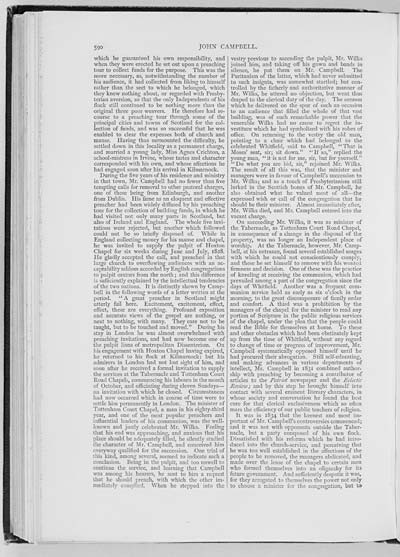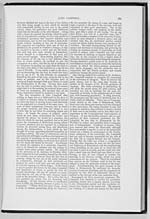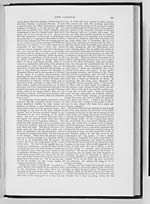Volume 3 > Half-Volume 6
(236) Page 590
Download files
Individual page:
Thumbnail gallery: Grid view | List view

590 which he guaranteed his own responsibility, and when they were erected he set out upon a preaching tour to collect funds for the purpose. This was the more necessary, as, notwithstanding the number of his audience, it had collected from liking to himself rather than the sect to which he belonged, which they knew nothing about, or regarded with Presby- terian aversion, so that the only Independents of his flock still continued to be nothing more than the original three poor weavers. He therefore had re- course to a preaching tour through some of the principal cities and towns of Scotland for the col- lection of funds, and was so successful that he was enabled to clear the expenses both of church and manse. Having thus surmounted the difficulty, he settled down in this locality as a permanent charge, and married a young lady, Miss Agnes Crichton, a school-mistress in Irvine, whose tastes and character corresponded with his own, and whose affections he had engaged soon after his arrival in Kilmarnock. During the five years of his residence and ministry in that town, Mr. Campbell had no fewer than five tempting calls for removal to other pastoral charges, one of these being from Edinburgh, and another from Dublin. His fame as an eloquent and effective preacher had been widely diffused by his preaching tour for the collection of building funds, in which he had visited not only many parts in Scotland, but also of Ireland and England. The whole five invi- tations were rejected, but another which followed could not be so briefly disposed of. While in England collecting money for his manse and chapel, he was invited to supply the pulpit of Hoxton Chapel for six weeks during June and July, 1828. He gladly accepted the call, and preached in that large church to overflowing audiences with an ac- ceptability seldom accorded by English congregations to pulpit orators from the north; and this difference is sufficiently explained by the intellectual tendencies of the two nations. It is distinctly shown by Camp- bell in the following words of a letter written at the period. " A great preacher in Scotland might utterly fail here. Excitement, excitement, effect, effect, these are everything. Profound exposition and accurate views of the gospel are nothing, or next to nothing, with many. They care not to be taught, but to be touched and moved." During his stay in London he was almost overwhelmed with preaching invitations, and had now become one of the pulpit lions of metropolitan Dissenterism. On his engagement with Hoxton Chapel having expired, he returned to his flock at Kilmarnock: but his admirers in London had not lost sight of him, and soon after he received a formal invitation to supply the services at the Tabernacle and Tottenham Court Road Chapels, commencing his labours in the month of October, and officiating during eleven Sundays� an invitation with which he closed. Circumstances had now occurred which in course of time were to settle him permanently in London. The minister of Tottenham Court Chapel, a man in his eighty-third year, and one of the most popular preachers and influential leaders of his communion, was the well- known and justly celebrated Mr. Wilks. Feeling that his end was approaching, and anxious that his place should be adequately filled, he silently studied the character of Mr. Campbell, and conceived him everyway qualified for the succession. One trial of this kind, among several, seemed to indicate such a conclusion. Being in the pulpit, and too unwell to continue the service, and learning that Campbell was among his hearers, he sent to him a request that he should preach, with which the other im- mediately complied. When he stepped into the vestry previous to ascending the pulpit, Mr. Wilks joined him, and taking off his gown and bands in silence, he put them on Mr. Campbell. The Puritanism of the latter, which had never submitted to such insignia, was somewhat startled; but con- trolled by the fatherly and authoritative manner of Mr. Wilks, he uttered no objection, but went thus draped to the clerical duty of the day. The sermon which he delivered on the spur of such an occasion to an audience that filled the whole of that vast building, was of such remarkable power that the venerable Wilks had no cause to regret the in- vestiture which he had symbolized with his robes of office. On returning to the vestry the old man, pointing to a chair which had belonged to the celebrated Whitfield, said to Campbell, "That is Moses' seat, sir; sit down." "If so," replied the young man, "it is not for me, sir, but for yourself." "Do what you are bid, sir," rejoined Mr. Wilks. The result of all this was, that the minister and managers were in favour of Campbell's succession to Mr. Wilks; and as a touch of Presbyterianism still lurked in the Scottish bones of Mr. Campbell, he also obtained what he valued most of all�the expressed wish or call of the congregation that he should be their minister. Almost immediately after, Mr. Wilks died, and Mr. Campbell entered into the vacant charge. On succeeding Mr. Wilks, it was as minister of the Tabernacle, as Tottenham Court Road Chapel, in consequence of a change in the disposal of the property, was no longer an Independent place of worship. At the Tabernacle, however, Mr. Camp- bell, at his entrance, found several established usages with which he could not conscientiously comply, and these he set himself to remove with his wonted firmness and decision. One of these was the practice of kneeling at receiving the communion, which had prevailed among a part of the congregation since the days of Whitfield. Another was a frequent com- munion service held as early as six o'clock in the morning, to the great discomposure of family order and comfort. A third was a prohibition by the managers of the chapel for the minister to read any portion of Scripture in the public religious services of the chapel, under the plea that the people could read the Bible for themselves at home. To these and other obstacles which had been obstinately kept up from the time of Whitfield, without any regard to change of time or progress of improvement, Mr. Campbell systematically opposed himself until he had procured their abrogation. Still self-educating, and making advances in various departments of intellect, Mr. Campbell in 1831 combined author- ship with preaching by becoming a contributor of articles to the Patriot newspaper and the Eclectic Review; and by this step he brought himself into contact with several eminent literary characters, in whose society and conversation he found the best cure for that clerical exclusiveness which so often mars the efficiency of our public teachers of religion. It was in 1834 that the keenest and most im- portant of Mr. Campbell's controversies commenced; and it was not with opponents outside the Taber- nacle, but a party composed of his own flock. Dissatisfied with his reforms which he had intro- duced into the church-service, and perceiving that he was too well established in the affections of the people to be removed, the managers abdicated, and made over the lease of the chapel to certain men who formed themselves into an oligarchy for its future government. And sufficiently despotic it was, for they arrogated to themselves the power not only to choose a minister for the congregation, but to
Set display mode to:
![]() Universal Viewer |
Universal Viewer | ![]() Mirador |
Large image | Transcription
Mirador |
Large image | Transcription
Images and transcriptions on this page, including medium image downloads, may be used under the Creative Commons Attribution 4.0 International Licence unless otherwise stated. ![]()
| Biographical dictionary of eminent Scotsmen > Volume 3 > Half-Volume 6 > (236) Page 590 |
|---|
| Permanent URL | https://digital.nls.uk/74514746 |
|---|---|
| Attribution and copyright: |
|
| Description | Volume III. Contains names alphabetically from Macadam to Young. |
|---|

